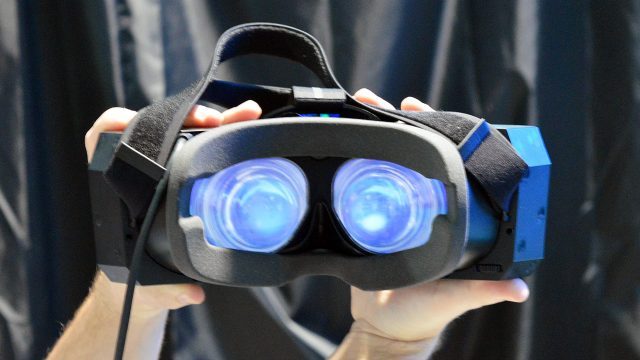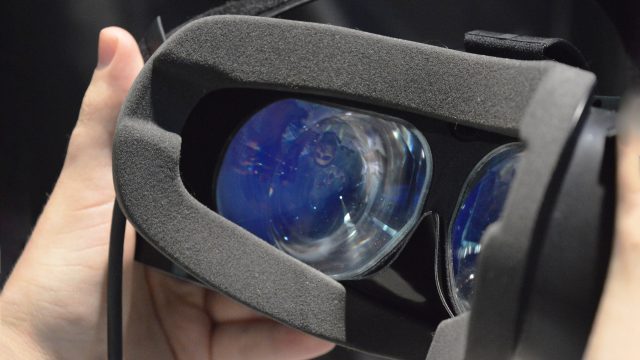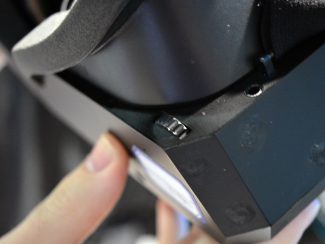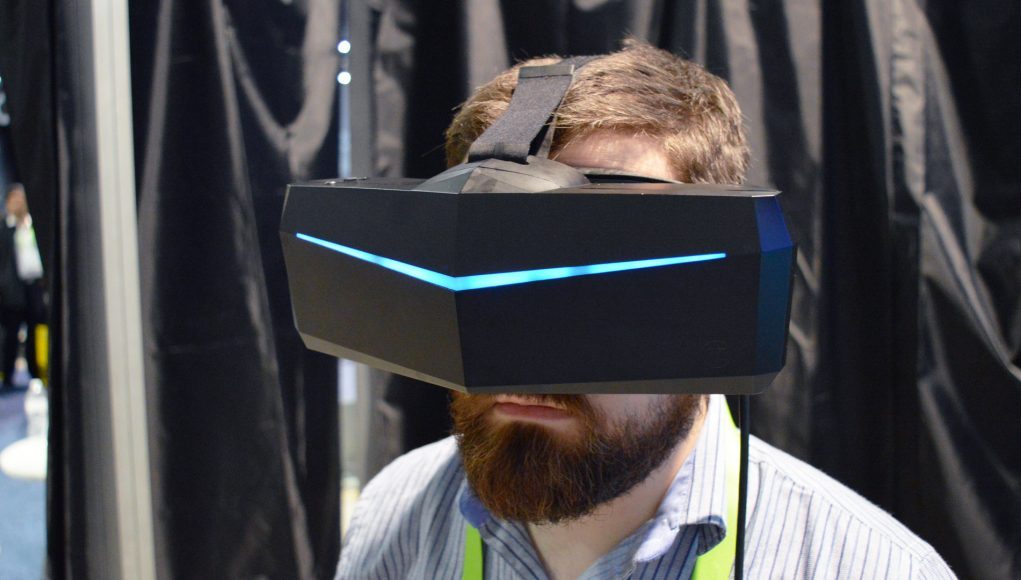Pimax, the Chinese VR startup honing in on a consumer headset with a huge field of view, is said to soon be shipping the first Pimax “8K” headsets to Kickstarter backers. While the company executed a very successful Kickstarted and parlayed that into a healthy investment, it remains to be seen if Pimax can go the final mile to meet the fevered expectations set upon it by the West’s high-end VR community. We go hands-on with the company’s latest prototype headset at CES 2018 to see where things stand.
Update (1/12/18): Following our hands-on with the latest “8K” prototype, Pimax responded to acknowledge some of the issues and explain their plans going forward.
Original Article (1/10/18): Though Pimax has successfully developed and brought to market the Pimax 4K headset, the company piqued the attention of the hardcore VR community in the West when they set their eyes toward making the “8K,” a VR headset with a purported 200 degree field of view—far beyond anything from incumbents in the consumer VR space. The name “8K,” as we’ve explained, is a misnomer bordering on false advertisement; though the headset features a pair of 4K displays, you need the resolution equivalent of four 4K displays to reach what most would call 8K resolution.
We’ve tried the company’s various “8K” prototypes over the course of development. With the headset soon to begin shipping to Kickstarter backers, we’ve gone hands-on with the very latest prototype, including the unique near-final lenses, this week at CES 2018.
Field of View Envy
 Let’s talk first about the claimed 200 degree field of view. Yes, it’s very wide. Much wider than you’ve ever experienced on a Rift or a Vive. The world almost feels like it wraps around the sides of your head when you put it on. We won’t be able to verify the accuracy of the 200 degree claim until we have our hands on our own headset for independent testing, but whatever the actual FOV measurement turns out to be, it’s a huge leap forward over today’s consumer headsets regardless.
Let’s talk first about the claimed 200 degree field of view. Yes, it’s very wide. Much wider than you’ve ever experienced on a Rift or a Vive. The world almost feels like it wraps around the sides of your head when you put it on. We won’t be able to verify the accuracy of the 200 degree claim until we have our hands on our own headset for independent testing, but whatever the actual FOV measurement turns out to be, it’s a huge leap forward over today’s consumer headsets regardless.
Unique Lenses

The super wide field of view is achieved thanks to a unique, custom designed lens which appears to be a hybrid of the typical circular Fresnel lens that you would find in a VR headset, but with a segment of a larger lens fused into one side, creating the overall profile of an oval with a flat top and bottom. The feeling of being enraptured with such a wide field of view is promising, but there’s some kinks in the optics that are a drag on the headset’s potential for deep immersion.
Distortions Improved but Artifacts Remain
The good news is that for the latest lenses, Pimax seems to have come a long way with their distortion profile (which distorts the rendered image to counteract the lens’ inherent distortions). Prior prototypes that I used showed clear stretching and warping that was apparent as you moved your head around. That’s mostly gone, but in its place are some other unmistakable artifacts.
Looking through the headset, a few degrees at the top and bottom of my view were small sections that almost appeared to be reflecting what was being shown on the display. As I moved my head, the image in these areas moved to, but in a way not consistent with the rest of the image. The same holds true for the extreme periphery on the left and right of my view, though instead of an apparently reflected image, these sections appeared highly blurred.
The result is that around the perimeter of your vision you see slivers of moving imagery that isn’t consistent with the rest of the scene—something which your peripheral vision is very sensitive too. It seems that these areas might be an effort to push the field of view just a little bit further, but in practice they are distracting and immersion defying. I would far rather pull the field of view in by a few degrees if it meant eliminating these distracting areas.
Hungry for Pixels
When it comes to sharpness, you’ll definitely see a bump over headsets like the Rift and Vive, but maybe not as much as you’d expect if relying on a simple on-paper resolution comparison. While it’s tempting to think that the Pimax’s 3,840 × 2,160 per-display resolution will knock your socks off compared to the Rift or Vive’s 1080 × 1,200 per-display resolution, it’s important to remember that the resolution of the Pimax “8K” is stretched over a much wider field of view, which means that the increase in pixel density isn’t as drastic it might seem from the resolution figures alone.

You will see an increase in sharpness, but it isn’t the end of the screen door effect and aliasing, counter to the claim on Pimax’s website: “the graininess and ‘screen door’ will never disturb you again.” Individual pixels are too small to make out, but you’ll be able to see clumps of them revealed by the structure of the screen door effect which appears a bit like a diagonal grid in the Pimax “8K”.
Unexpected Mura
There’s also visible mura, which is odd. Most VR headsets I’ve seen with LCD panels have almost no issue with mura (color and brightness inconsistency between pixels, resulting in a faint ‘cloudy’ look over your view). Pimax is using LCD displays, and I therefore expected little to no mura, but it was apparent, especially because it seemed to be concentrated into long horizontal rows of pixels that appeared slightly lighter than those above or below them. Pimax is surely still tweaking their screens, and I would very much hope to see the mura cleaned up ahead of launch.
Pimax told me that the panels are running currently at 80Hz, and they’re hoping to be able to push that up to the 90Hz they’ve been advertising. In my time with the headset I didn’t spot any obvious color smearing or overt persistence blurring, but I also wasn’t in an ideal testing environment to spot those artifacts, so I’ll want to give them a closer look at the next opportunity. As for god rays, they’re there too, owing to the Fresnel optics. As ever, they’re most noticeable in high contrast scenes.
– – — – –
Overall clarity is harder to assess without a direct side-by-side with various headsets. The screen door is definitely reduced compared to first-gen PC headsets, but the “8K’s” LCD displays don’t appear to have as rich contrast or color than competitors with OLED displays. The mura also works against the benefits brought by sheer pixel density.
I also felt at times like my eyes were straining a bit to keep the images fused; this could have been due to a mismatched IPD. Thankfully is an IPD adjustment on the headset, but there’s at present no way to tell what the IPD of the headset is set to since it doesn’t presently report the setting back to the user as most other headsets do.







